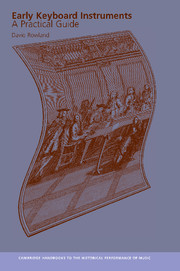Book contents
5 - Non-notated and notated issues
Published online by Cambridge University Press: 22 September 2009
Summary
Improvisation and preluding
Modern performers tend to play almost exclusively what has been notated by someone else, whereas musicians of the seventeenth, eighteenth and nineteenth centuries would have thought it odd not to be expected to improvise occasional movements, preludes or embellishments to melodies. Improvisation in one form or another is perhaps the most neglected aspect of early performance practices, and one that it is possible to revive by a study of the relevant sources.
There are numerous accounts from the seventeenth to the nineteenth centuries of keyboard players improvising complete works. For certain organists' posts in Germany the auditioning process required that performers should improvise preludes, fugues, chorale preludes or variations and chaconnes. Bach used similar skills in a performance on one of Silbermann's pianos before Frederick the Great in 1747 when he improvised a fugue on a theme given to him by the King – an event that prompted the subsequent composition of the Musical Offering. J. S. Bach's son Carl Philipp Emanuel was renowned for his improvisations and included a substantial chapter on the subject in his treatise. His advice largely has to do with the harmonic structure and figuration appropriate to free fantasias, although his comments are also relevant to the performance of preludes (see below).
Information
- Type
- Chapter
- Information
- Early Keyboard InstrumentsA Practical Guide, pp. 69 - 87Publisher: Cambridge University PressPrint publication year: 2001
